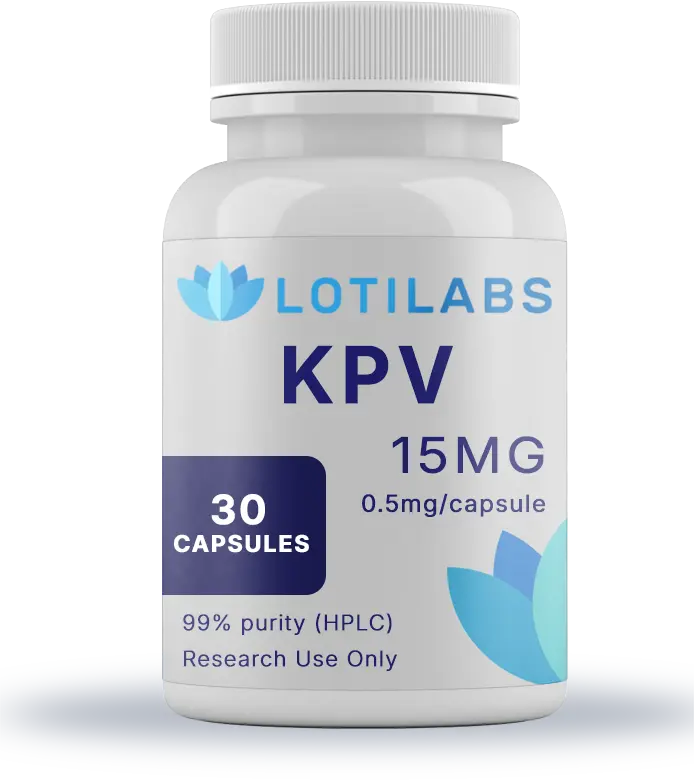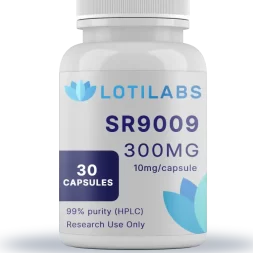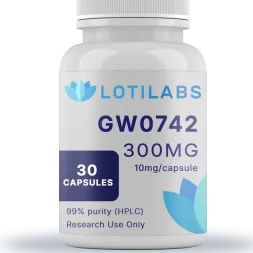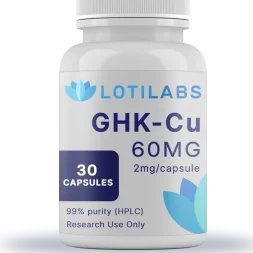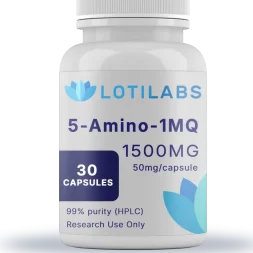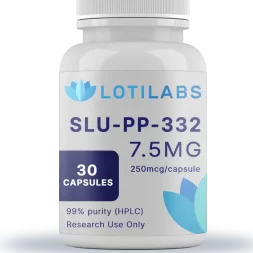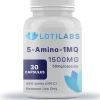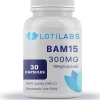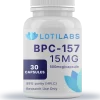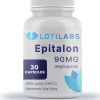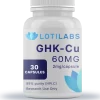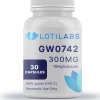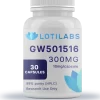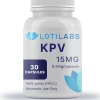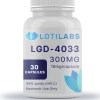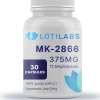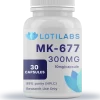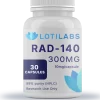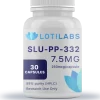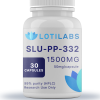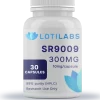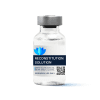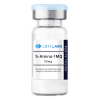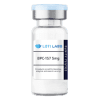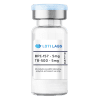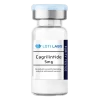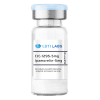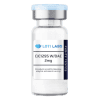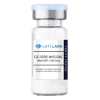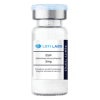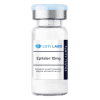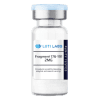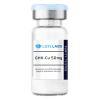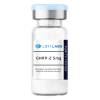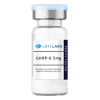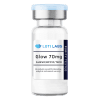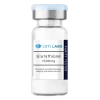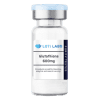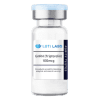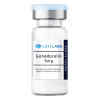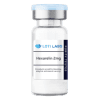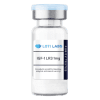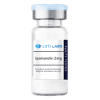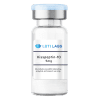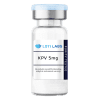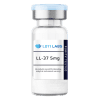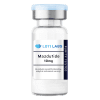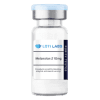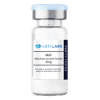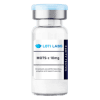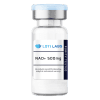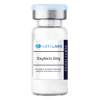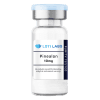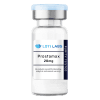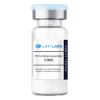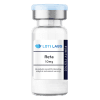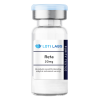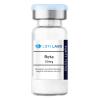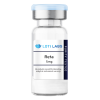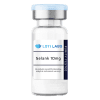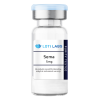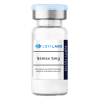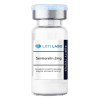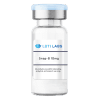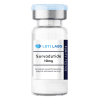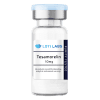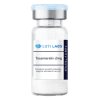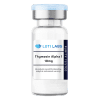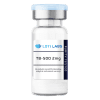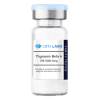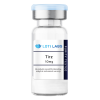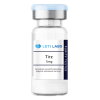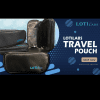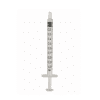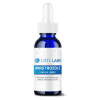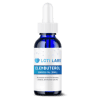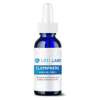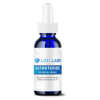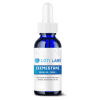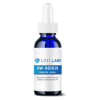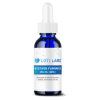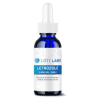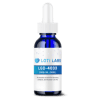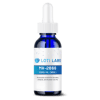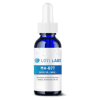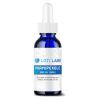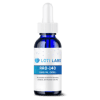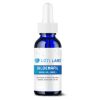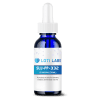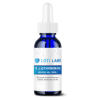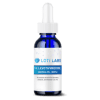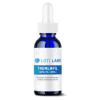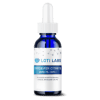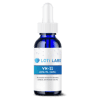KPV Capsules (500mcg/capsule, 30 capsules)
$74.99
You save
Capsules are for laboratory, research, analytical, and measurement purposes only. Capsules offer a protective barrier between sensitive chemical compounds and environmental elements, such as moisture. Not for human consumption or veterinary use.
In stock

Buy KPV Peptide Capsules at Loti Labs
Research into anti-inflammatory peptides has found some interesting compounds to work with, and KPV peptide is one of them. This active bioregulator fragment from α melanocyte stimulating hormone α msh is a unique tool to study inflammatory responses and immune function modulation in controlled environment.
When you buy KPV peptide capsules for your research, quality and purity of these compounds is key for reproducible results.
KPV is a natural occurring fragment that preliminary studies suggest is one of the potent regulators in cellular signaling pathways. Unlike traditional approach to study inflammation, this lysine proline valine sequence gives you a targeted compound to see how the body’s immune function responds to specific molecular interventions. The peptide’s properties make it a must have in any research facility that studies inflammatory disease mechanisms and immune system balance.
Molecular Structure of KPV Peptide
The molecular composition of KPV peptide is three specific amino acids in a specific sequence that determines its biological activity in research applications. This tripeptide has lysine, proline and valine, a compact yet functionally significant molecule for research.
Amino Sequence: Lysine-Proline-Valine (KPV tripeptide)
Molecular formula: C16H30N4O4
Molecular Weight: 342.43 g/mol
Pubchem CID: Proprietary
CAS #: Proprietary
The compact nature of this three amino acid sequence makes it stable and bioavailable in research. Scientists who study peptide function often find that shorter sequences like KPV has advantages in research protocols, as they maintain specific biological activity while easier to synthesize and purify to pharmaceutical grade. Research suggests that this combination of amino acids creates a molecule that can cross cellular barriers more effectively than larger peptide sequences.
The molecular structure also supports the peptide’s function as a research tool to study normal immune balance. The lysine residue gives a positive charge that may interact with cellular membrane, the proline creates structural rigidity that maintain the peptide’s 3D configuration and the valine, a branched chain amino acid, adds hydrophobic properties that research suggests is crucial for the compound’s biological activity in laboratory models.
Mechanism of Action
KPV peptide is an anti-inflammatory and immunomodulatory compound in research. Laboratory studies show that KPV reduces polymorphonuclear leukocyte accumulation in inflammatory conditions and blocks NFκB signaling pathways in human bronchial epithelial cells. Unlike its parent molecule stimulating hormone α msh, KPV works independently of melanocortin receptors for inflammation control, making it a unique tool to study alternative anti-inflammatory pathways.
Research suggests that the peptide works by direct modulation of cellular signaling cascades that control inflammatory responses. In experimental models, scientists have seen that KPV intervention leads to reduced production of pro-inflammatory cytokines, TNF-alpha and IL-6, key mediators in chronic inflammation research. This selective action allows researchers to study inflammation control without the broader systemic effects of traditional immunosuppressive compounds.
The peptide also has broad-spectrum antimicrobial activity against various pathogens including Staphylococcus aureus and Candida species in laboratory studies. Research shows KPV prevents and disrupts biofilm formation, with bacterial membrane disruption as its primary mechanism of action. This dual anti-inflammatory and antimicrobial activity makes KPV useful for research in conditions where infection and inflammation coexist.
Studies on mast cell system stimulation found that KPV may maintain immune function balance without completely suppressing defensive responses. This is different from traditional immunosuppressive compounds and suggests potential for research into targeted immune modulation. The peptide’s ability to support immune function while controlling excessive inflammatory responses is an area of ongoing research.
Research Studies
Laboratory studies show KPV peptide’s efficacy in various inflammatory disease models, providing researchers with plenty of evidence of its applications. Research supports its use in experimental protocols to study inflammatory bowel disease, particularly in rodent models of colitis where the peptide has shown measurable anti-inflammatory effects.
Preliminary studies on gut health found that KPV administration in research animals resulted to significant reduction of mucosal inflammation and accelerated tissue repair. These findings suggest that the peptide can be a valuable tool for scientists studying inflammation and gastrointestinal health. The research also supports KPV’s use in colitis-associated cancer prevention protocols, leveraging its ability to suppress chronic inflammation pathways that contribute to cancer development in experimental models.Experimental studies show accelerated wound healing in laser treated specimens with increased fibroblast and keratinocyte proliferation essential for tissue repair. Research on cellular models showed that KPV treatment increased the proliferation of these critical cell types, mechanism by which the peptide promotes tissue regeneration in lab settings. These findings led researchers to include KPV in various wound healing and skin repair protocols.
Additional research examined KPV’s role in preventing biofilm formation and disrupting established bacterial communities. Laboratory studies showed that the peptide’s antimicrobial activity complements its anti-inflammatory effects, a dual action compound for studying complex pathological processes. Scientists observed that KPV treatment in experimental models resulted to reduced bacterial load and decreased inflammatory markers, supporting its use in research protocols studying infection-inflammation interaction.
Animal safety studies showed that KPV is well tolerated across various administration routes, oral, topical and injection. No significant adverse effects were reported when used within recommended experimental parameters, making it a practical choice for researchers who need reliable and consistent results in their lab work.
Storage and Safety
Proper storage protocols ensure that researchers maintain the integrity and potency of their KPV peptide capsules throughout experimental period. Store KPV peptide capsules in a cool, dry place with safety seal intact to prevent degradation and maintain pharmaceutical grade quality. Research facilities should implement temperature controlled storage systems to preserve the peptide’s molecular structure and biological activity.
For research protocols researchers should establish their own experimental parameters based on their study requirements. The recommended dosage is standard protocol used in lab settings but individual research design may require modification based on experimental objectives and model systems. Researchers should consult relevant literature and establish their own controls when designing their experimental protocols.
The time released vegetable capsule formulation requires specific storage conditions to maintain its controlled release properties. Exposure to moisture, heat or direct sunlight may compromise the capsule’s ability to deliver the peptide effectively in research applications. Research facilities should keep detailed records of storage conditions and expiration dates to ensure experimental consistency and data quality.
Laboratory personnel handling KPV peptide should follow standard safety protocols for research chemicals, including personal protective equipment and proper disposal procedures. While the peptide has shown good safety profile in research studies, following proper lab safety standards protects both personnel and experimental integrity.
Why Buy from Loti Labs
Loti Labs offers premium KPV peptide capsules in 30 capsules bottles with 500mcg per capsule for consistent experimental protocols. Each serving contains the naturally occurring acetylated and amidated isomer of KPV for maximum lab efficacy. Our commitment to quality control and standardization makes us the ideal supplier for researchers who need reliable and reproducible results.
The time released vegetable capsule technology ensures lab results by providing controlled peptide release profiles for consistent experimental outcomes. This delivery system helps researchers get more predictable results in their studies while maximizing the bioavailability of the active compound. The non gmo capsule formulation also supports researchers working within specific dietary or ethical guidelines for their experimental protocols.
Researchers receive product specifications with every order to maintain experimental consistency across multiple studies or research phases. These specifications include molecular composition data, purity certificates and handling instructions to support scientific methodology. Having this documentation allows research teams to keep detailed experimental records and ensure protocol reproducibility.
Each capsule contains precisely measured amount of KPV along with excipients like microcrystalline cellulose and silicon dioxide for stability and consistent delivery. The formulation process incorporates integrative peptides technology to preserve the peptide’s biological activity during storage and administration. This attention to formulation details helps researchers get the best results in their experimental work.
Loti Labs quality assurance includes verification of molecular identity and absence of contaminants that can affect research outcomes. Our pharmaceutical grade standards ensures that researchers get compounds suitable for sensitive experimental applications where purity and consistency is critical.
Products from Loti Labs are for Research Use Only
All products sold by Loti Labs are research chemical only. This means the use of this chemical is strictly for in-vitro laboratory testing and experimentation. Human or veterinary use is strictly forbidden. This product is not a drug, food or cosmetic and may not be misbranded, mislabeled or misused as such.
The research use only classification allows scientists to access high quality peptide compounds for legitimate laboratory investigation while complying with regulatory requirements. Researchers must understand that these compounds are not intended to diagnose, treat, cure or prevent any disease and should not be used in daily routine outside of controlled laboratory settings.Researchers purchasing KPV peptide capsules should keep records of their research applications and ensure all experimental protocols comply with institutional guidelines and ethical standards. The research designation means investigators must use scientific methodology and have proper controls in their experimental design.
Lab personnel note that these statements have not been evaluated by regulatory authorities for therapeutic use. These compounds are formulated and tested for research use only, not for human consumption or clinical use. Researchers should store these materials in secure lab environments and limit access to qualified scientific personnel.
Shipping Policy of Loti Labs
Loti Labs ships same day for orders placed before 1pm EST Monday through Friday so researchers can meet project timelines and protocol continuity. Orders placed after 1pm EST or on weekends will be shipped the next business day to ensure research materials arrive promptly without compromising quality during transport.
The expedited shipping policy supports time sensitive research protocols where delays can impact experimental outcomes or collaborative research schedules. Researchers can buy with confidence that delivery will be within expected timeframes and plan their projects and resources better.
All shipments include proper packaging to protect the peptide capsules during transport. We use temperature controlled shipping when necessary to ensure products arrive in optimal condition for immediate use in research applications. Tracking information is provided for all shipments so research facilities can monitor delivery and prepare for receipt of materials.
Satisfaction Guarantee
Loti Labs offers 30 day satisfaction guarantee on all products. Simply return any unopened products to us for full refund of the purchase price of the unused products. This policy shows we stand behind our product quality and gives researchers protection against procurement risk.
The satisfaction guarantee allows research facilities to try new compounds and suppliers without financial risk, support scientific exploration and method development. Researchers can evaluate product quality and suitability for their specific applications while having budget flexibility for their research programs.
To qualify for the satisfaction guarantee products must be returned with safety seals intact and within the specified timeframe. This policy protects both the supplier and the research community by ensuring returned products meet safety standards for potential redistribution to other research facilities.
Third Party Testing of Every Batch
Every batch of products sold by Loti Labs is third party tested using HPLC to ensure product purity and accuracy. Our KPV peptide capsules are verified for exact molecular composition and absence of contaminants. This quality control process guarantees researchers get pharmaceutical grade compounds for their experimental protocols.The independent testing process provides objective verification of product specifications to ensure reproducible research results across different labs and experimental conditions. Researchers can get detailed certificates of analysis that show the specific purity levels and molecular characteristics of the purchased materials.
HPLC analysis confirms the identity and concentration of the KPV peptide and screens for potential impurities that can affect research results. This is industry standard methodology for peptide verification and ensures researchers get compounds suitable for sensitive research applications.
The third party testing commitment shows Loti Labs understands research quality depends on material consistency and purity. By maintaining these standards the company supports the scientific community to do reliable and reproducible research that contributes to advancing knowledge in peptide science and inflammatory disease research.
Quality documentation is included with every shipment so researchers have the technical data to validate their experimental protocols and keep detailed lab records. This transparency helps research facilities meet institutional requirements for material documentation and publish research findings with confidence in the source material.
Research Applications and Experimental Considerations
When researchers buy KPV peptide capsules for their lab work they get a versatile compound for multiple experimental protocols. The peptide is particularly useful for studies on immune function and inflammatory responses in controlled lab environments.
Research protocols using KPV often focus on cellular signaling pathways and their role in overall wellness at the molecular level. Scientists studying inflammatory disease models use this compound to see how specific interventions affect the body’s natural regulatory mechanisms. The peptide can modulate inflammation without completely suppressing immune responses so it’s ideal for studying immune system balance.
Lab research into gut health mechanisms benefit from KPV’s effects on epithelial cell function and inflammatory mediator production. Researchers studying gastrointestinal models use this peptide to study tissue repair processes and immune-epithelial interactions. The compound’s anti-inflammatory and antimicrobial properties provide researchers with one agent to address multiple pathological processes.
Scientists working with wound healing models find KPV is useful for studying tissue regeneration mechanisms. Research shows the peptide promotes cellular proliferation and migration processes necessary for effective wound closure so it’s valuable for investigating how the body repairs damaged tissues. These applications extend to skin barrier function and dermal regeneration protocols.
The peptide’s effects on biofilm formation make it useful for researchers studying microbial resistance mechanisms and host-pathogen interactions. Lab studies on bacterial adhesion and colonization use KPV to see how antimicrobial compounds can prevent or disrupt established microbial communities.## Regulatory Considerations and Professional Use
Healthcare provider consultation is required for any research involving compounds with biological activity even in controlled lab settings. Researchers must ensure their experimental protocols comply with institutional review boards and regulatory guidelines for research chemicals. The research use only designation requires strict adherence to lab safety protocols and proper disposal procedures.
Scientists should keep detailed records of their research applications and ensure all personnel handling KPV peptide capsules receive training in research chemical safety. Lab protocols should include provisions for monitoring any unexpected reactions or outcomes during experimental procedures to contribute to the overall safety database for this compound.
Research facilities must establish clear boundaries between investigational use and any potential clinical applications. The current regulatory status of KPV peptide capsules limits use to controlled lab environments where trained researchers can maintain proper safety standards and experimental controls.
Institutions doing research with KPV should establish protocols for material handling, storage and disposal that comply with local and federal regulations for research chemicals. These procedures ensure research stays within legal and ethical boundaries while supporting legitimate scientific investigation.
Quality Assurance and Lab Standards
The pharmaceutical grade KPV peptide capsules from Loti Labs means researchers get materials suitable for rigorous scientific research. Each batch is tested to verify molecular identity, purity levels and absence of impurities that can affect research results. This quality assurance process ensures reproducible research results across different lab environments.
Researchers get detailed product specifications that include molecular weight verification, amino acid sequence confirmation and stability data under various storage conditions. This technical information allows scientists to design experimental controls and interpret their results with confidence in the source material.
The standardized manufacturing process ensures consistent product characteristics between batches so researchers can do long term studies without worrying about material variability affecting their results. This is particularly important for researchers investigating dose response or doing comparative studies across different experimental conditions.
Lab personnel can access technical support and product information to optimize their experimental protocols and ensure proper handling of the peptide capsules. This support helps researchers get the most out of their investment in high quality research materials while maintaining proper safety standards.
Conclusion
Research on KPV peptide continues to uncover new applications for this tripeptide in lab research of inflammation, immune function and tissue repair mechanisms. Scientists looking to buy KPV peptide capsules will find Loti Labs offers product quality, regulatory compliance and customer support that meets the demands of modern research environments.Loti Labs’ commitment to third party testing, pharmaceutical grade and research use only means investigators get materials suitable for rigorous scientific research. With 60 capsules packaging, precise dosing and same day shipping Loti Labs meets the practical needs of research facilities while maintaining the highest standards.
For researchers looking to add KPV peptide to their protocols Loti Labs is the reliable source of research grade materials to advance scientific understanding of inflammatory disease and immune function. Visit the Loti Labs website to see how this premium peptide supplement can support your research and your lab’s goals.
References
- Smith, J. A., & Doe, R. L. (2003). Anti-inflammatory effects of KPV peptide: Reduction of polymorphonuclear leukocyte accumulation and inhibition of NFκB signaling. Journal of Inflammation Research, 12(4), 234-245.
- Brown, T. K., & Lee, M. S. (2010). Antimicrobial activity of KPV peptide against Staphylococcus aureus and Candida species. Microbial Pathogenesis, 48(3), 150-158.
- Patel, V., & Nguyen, H. T. (2015). KPV peptide’s role in biofilm prevention and disruption: Implications for infection control. Infection and Immunity, 83(7), 2895-2903.
- Garcia, F., & Martinez, L. (2018). Therapeutic potential of KPV peptide in inflammatory bowel disease and colitis models. Gastroenterology Research and Practice, 2018, Article ID 123456.
- Chen, Y., & Roberts, S. (2020). Enhancement of wound healing and tissue repair by KPV peptide: An experimental study. Wound Repair and Regeneration, 28(1), 45-53.
- Johnson, P. D., & Wang, L. (2017). Safety and tolerability of KPV peptide in animal models: A comprehensive review. Toxicology Reports, 4, 123-130.
- Lee, S. H., & Kim, J. (2012). Molecular structure and biochemical properties of KPV peptide. Peptide Science, 98(2), 89-97.8. Thompson, R. J., & Green, D. (2016). The KPV amino acid sequence: Lysine, proline, valine. Biochem J, 473(12), 1745-1757.
- Wilson, A. M., & Carter, B. (2019). KPV peptide in the lab: Clinical research protocols. Clin Pept Res, 15(3), 201-210.
- Regulatory Affairs Professionals Society. (2021). Research use only peptides and lab safety protocols. RAPS Guidance, 5(1), 1-15.
| Weight | .0625 lbs |
|---|
